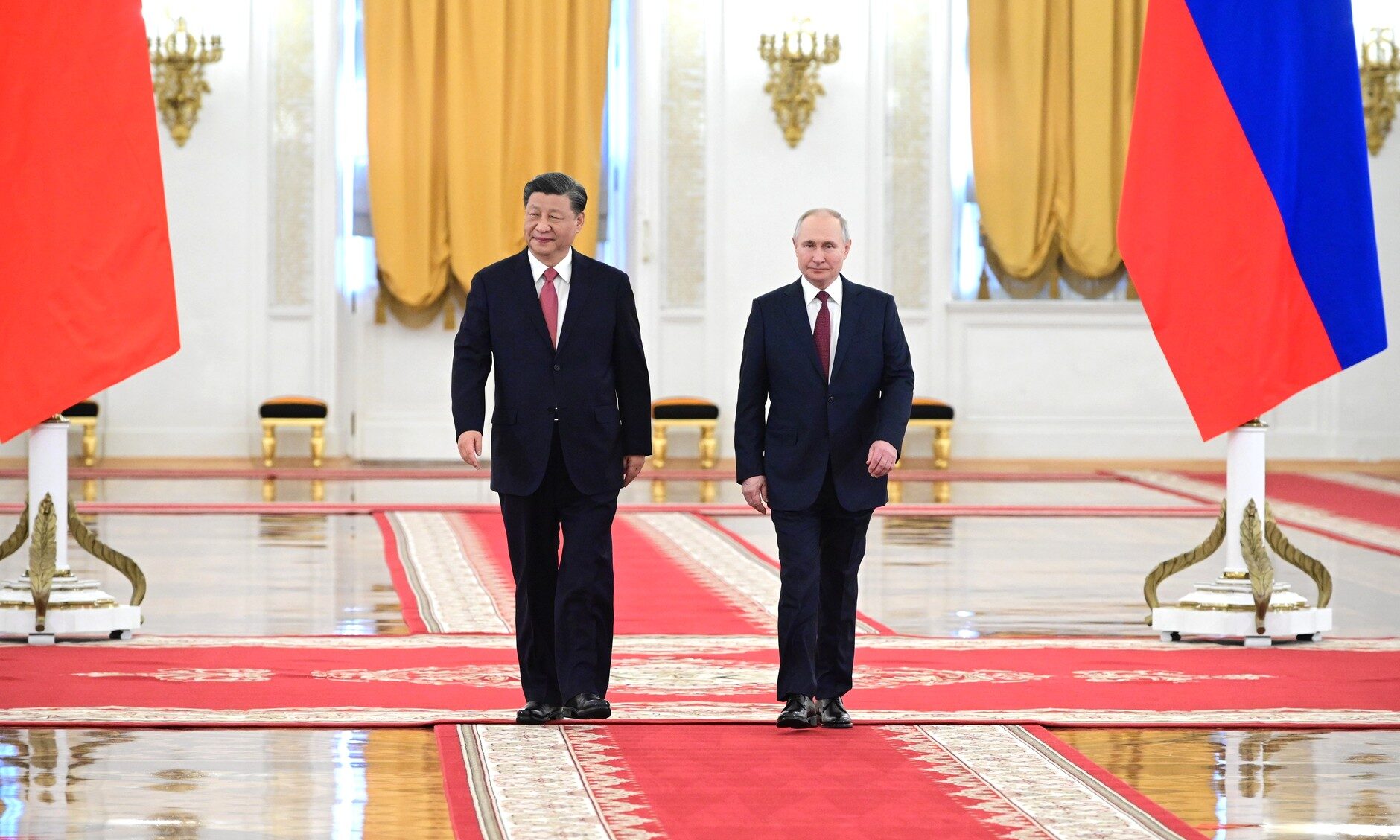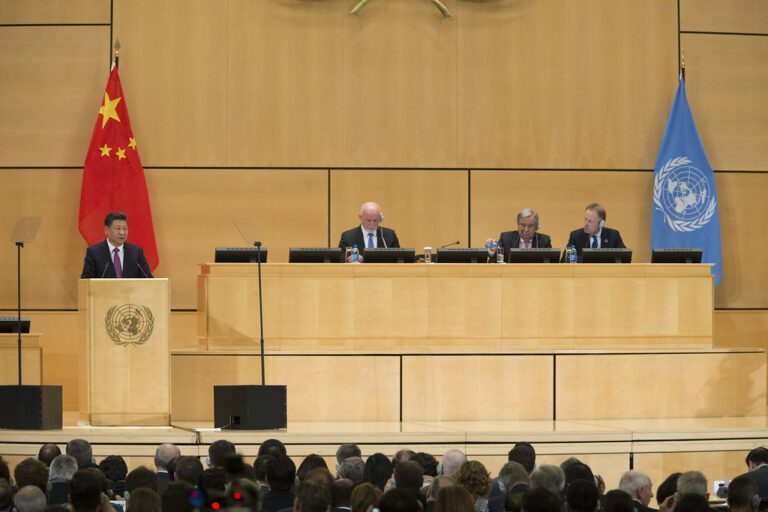
While the offer to join and grow within the liberal international system has been on the table for both Moscow and Beijing, neither has been willing to accept the rules of the game. Authoritarian expansionism, in moral and in territorial terms, remains the key goal for both regimes.
The current strengthening of Sino-Russian cooperation and the setting of common goals will continue to negatively reshape the rules and principles of current world affairs. The alignment has a solid foundation in the deeply rooted and shared worldview of both countries, as we argue in a recent report. Leveraging either of the regimes against the other is thus not realistic.
Nonetheless, European leaders, including German Foreign Minister, Annalena Baerbock, keep on insisting that Beijing has influence over Moscow and that this leverage could be harnessed to broker peace in Ukraine. While neither assumption is correct, insisting on them underlines the easy, corner-cutting solutions European leaders are seeking to bring peace to Ukraine.
Following the recent visit by French President, Emmanuel Macron, to Beijing, Chinese media praised him for his “alternative thinking” in suggesting that Europe should seek distance from US policies regarding Taiwan.
Apparently, according to these views, Macron goes against typical Western thinking, governed by “capital” that dominates liberal elections as well as media. Due to this domination, Western “capital power” is seen to control the world. The view is that, given Chinese and Russian resistance against the rule of Western capital, they have set themselves as targets for the West to destroy.
Taking this into consideration, Beijing is highly unlikely to broker any peace deal to the detriment of Russia before the Taiwan question has been ‘resolved’ (to the benefit of mainland China). Moscow, for its part, is equally unlikely to accept a junior partner role in the process, which would be at odds with its perceived status.
In fact, the reason why trying to engage Beijing in a united front against Moscow is unhelpful can be unraveled by analyzing the commonalities in exceptionalism, beliefs in great power status, and threat perceptions of both regimes.
Different from the Rest
First, both China and Russia perceive their culture and nation as exceptional and representing a distinguished civilization. In this vision of national greatness, their territorial sovereignty seems to extend beyond state borders to nearby territories and neighboring countries. In this context, they view themselves as the sole defenders of the civilizational culture they represent with special rights in their vicinities.
Another key commonality between Moscow and Beijing is the weaponization of their cultural civilizations as a defense against liberal, so-called “Western” values, including democracy, human rights, and the rule of law. By instrumentalizing their perceived exceptionalism, the main goal of both regimes is to suppress any social unrest and defend the political status quo of the ruling elite.
Exceptionalism thus supports regime survival but also forms the basis for Russia’s and China’s international conduct. Both states seek to create moral justifications for authoritarian statecraft to erode the liberal normative order. To this end, they promote a vision in which “human rights should be protected in accordance with the specific situation in each country.”
Great Powers Play According to their Own Rules
Second, Moscow and Beijing view themselves internationally as belonging to the most prominent “great powers” club, having wider rights than “regular” countries. At the same time, both consider that they were deprived of their “rightful place” on the international stage by the US-led “collective West”. Therefore, the alignment between the two powers signifies the end of the perceived humiliation and re-taking of a leading role among a handful of superpowers.
The Russian war against Ukraine is a good reflection of this new assertive policy. Kremlin justified its February invasion by the need to defend itself against NATO’s expansion and general Western adventurism, while China supported Russia’s demands for a new security deal in Europe as legitimate.
The persistent need to confirm their great power status is a key influence on the behavior of China and Russia abroad. While for Moscow, expansionism is mostly geopolitical, for Beijing, in addition to strengthening control over Taiwan, and the South China Sea, the focus is on the information domain in the form of narrative warfare that seeks to address the perceived past colonial (West) and imperial (Japan) humiliation, which includes this lost territory within the Chinese civilizational sphere.
Given that the superpower status of neither regime is properly recognized internationally, they seek it through alternative and informal institutions, as well as regional arrangements with like-minded states (e.g., BRICS, CSTO, EEU, SCO). In addition, they use “grey zone” threat-building in various key domains, ranging from the economy to the military and disinformation to build major power relevance.
Both regimes are also aware of their legitimacy being dependent on the will of the people and domestic populist discourses, which are often built upon the perceived superpower status. Given that the strategic narratives of China often depict the inevitable rise of China and equally inevitable decline of the West in general, and the US, in particular, a Ukrainian victory would undermine the notion of declining US hegemony and thus diminish Beijing’s narratives.
Shared Threat Perceptions
Third, both Moscow and Beijing perceive the so-called West and the US as the biggest external threat, not only to their own regimes but to their cultures and way of life. Thus, a deeply entrenched distrust towards the liberal West exists in both states, which is expressed in the overly suspicious approach to Western political and economic initiatives in the closer neighborhoods of the two countries.
As of now, the shared aim of Moscow and Beijing is to transform the international system into greater “multipolarity” and thus diminish US influence and presence. These common goals were described in great detail in the newly released “Concept of the Foreign Policy of the Russian Federation”.
The shared threat perception lays the foundation for the current Sino-Russian. Given that the common enemy stays in place, both are likely to strengthen their cooperation while downplaying their differences (for instance in the Arctic and Central Asia).
Do Not Expect a Sino-Russian Split
A shared threat perception, an aspiration to achieve “great power” status, exceptionalism, geographical proximity, as well as autocratic roots constitute a common denominator, which is the basis for Sino-Russian mutual understanding. This, coupled with their international grievances and global ambitions, provide legitimacy for their authoritarian rule domestically, as well as for coercive measures internationally, taking precedence over other calculations.
Yet the same characteristics also contribute to distrust and insecurity in their cooperation. The main characteristics of both states’ strategic cultures simultaneously facilitate and limit cooperation. This is likely to prevent Moscow and Beijing from building a solid long-lasting alliance.
Considering these realities, European leaders need to develop a joint understanding of China and Russia. Justifying engagement with non-liberal, authoritarian actors solely by economic necessities is hazardous (vide the energy cooperation with Russia). Instead, commonality should be noted in structures, discourses, narratives, and practices that showcase the shared hierarchical imperial worldviews of Beijing and Moscow.
Present-day Russia and China can both be viewed as aspiring empires that flexibly pose as either victims of Western hegemony or superior civilizations depending on their narrative needs. Using this flexibility, they can also adopt either role in the Global South, which has dire implications for the West.
Instead of trying to play Moscow and Beijing against each other, the focus should be on building the shared situational understanding needed to develop joint responses.
Written by
Jukka Aukia
Jukka Aukia, is a researcher at the European Centre of Excellence for Countering Hybrid Threats. He holds a PhD in Asian Studies from the University of Turku and a master’s degree in Asian Studies from the University of Amsterdam. Previously, Mr. Aukia worked as a post-doctoral researcher at the Centre for East Asian Studies, University of Turku.
Lucjan Kubica
Lucjan Kubica is an expert on Russia and Eastern Partnership countries at the European Centre of Excellence for Countering Hybrid Threats. Currently holding the position of the Deputy Director of Research and Analysis at the Centre. Previously, Mr. Kubica worked in the Polish Central Administration as an expert on Russia’s energy policy and hybrid operations.


